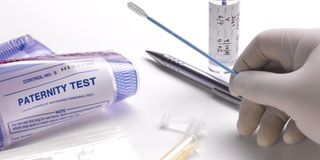Prime
‘Your father’ is not your father: DNA threatens to break families

What you need to know:
DNA paternity testing is the use of DNA profiles to determine whether an individual is the biological parent of another individual. According to the Ministry of Internal Affairs about 40 people are seeking partenity tests per week as opposed to three per week about two years ago.
In 2013, after Elizabeth (not real name) found out that she was pregnant, she shared the good news with her boyfriend. He, however, told her he was not prepared to take on fatherhood duties.
Two weeks after giving birth to a baby boy, the boyfriend stealthily took him for express paternal genetic testing (DNA testing).
“I was working at a television station and I could not leave because I would lose the job. He rushed to a DNA clinic without my consent,” she recounts.
The results were positive. He was the biological father of the baby, but he accused Elizabeth of conniving with the doctors to alter the DNA results.
The peddling of lies and allegations of infidelity against her were some of the most depressing moments Elizabeth has had to endure in her life.
Is it a punishment?
New DNA samples were taken to the UK on orders of her boyfriend and results remained the same. According to Elizabeth, the man did give any child support.
She made a difficult decision to stop pursuing the father of her child and focused on fending for him.
“DNA is the worst punishment any man can give a woman. It drags you into depression and self-doubt. I felt lost and chose to be on my own,” she adds.
Years later, Elizabeth’s estranged boyfriend returned, claiming ownership of the child and demanded to see his son.
“No amount of apology can ease the pain I endured. I told him I am aware he is my son’s father, but I asked him to stay far from him,” she explains.
Elizabeth, who sought a new beginning in North America, says the DNA experience shattered her dream of raising her son with his father.
Sophie Ndagire says the father of her twins insisted on doing a DNA test, claiming that the children never resembled him.
“I knew he was the father of the children. But I got worried when we went for DNA at the clinic in Wandegeya,” she adds.
According to Ndagire, everything was handled by the man and the results were given to him.
“He told me that the children were not his and I was forced to call the clinic to confirm,” she recalls.
The truth sets us free
Ndagire says she was told that the one who pays for the DNA test is the one who accesses the results. With the motive of his intentions not known, the father later presented the right results indicating that he is the biological father of the children.
Although she felt traumatised by this whole experience, she was relieved that the truth eventually came out. Unlike Ndagire and Elizabeth, Sandra Mtendo willingly asked her husband to carry-out the DNA for their daughter.
Her intention was to close doors for doubt and she intentionally encouraged the move to make her husband comfortable.
“When we started to date, he told me that his ex-girlfriend had a child with another man, but forced paternity and fatherly roles on him. I encouraged him to go for a paternity test to avert his fears and get rid of insecurities in our relationship,” she explains.
The future of family
Elizabeth Zakumumpa, a lawyer and women rights activist, observes that the rush for DNA tests is a time bomb for the future of family in Uganda.
She reveals that in many cases where DNA is conducted, families end up in disunity, breakdown and even domestic violence.
Zakumumpa warns that the trend affects children’s’ rights. “Many children suddenly drop out of school and others are deprived of their right to childcare, the moment results do not come out in their favour,” she explains.
She advises authorities to rethink the policy on how results are shared to both parties and guidelines on how to effectively handle the matter in order to protect the interests of all parties.

Fathers have the right to know whether or not the children they are raising are theirs. PHOTO/ COURTSEY
Is family under attack?
Milly Nassolo, a human rights activist, warns that DNA might be silently creating a fatherless nation, especially at a time when the family institution is facing very many challenges.
“The DNA news has caused anxiety and doubt among couples, especially those that are not living together. Even whenever results are released in favour of both parties, trust is lost,” Nassolo shares.
She adds that much as the case would be different for parents who are not in a domestic relationship, there is much risk for family breakdown for the marrieds.
She advises parents to think about how such news would affect children before such a big decision is made, noting that DNA experience can be a gateway to mental breakdown among children.
Stephen Langa of Family Life Network says children should not be made to pay for what their parents did, but instead advises couples to find a way to bond and reconcile as families.
Why the rush for DNA?
The Ministry of Internal Affairs reveals that the number of men seeking DNA services has skyrocketed.
In a recent interview, Simon Mundeyi, the spokesperson of the Ministry of Internal Affairs, confirmed that the number of people seeking DNA has increased by 70 percent.
Zakumumpa says that in the age of economic crisis, the push for DNA has a correlation to financial insecurities. She says financial worries such as school fees, medical care and the day-to-day expenses of childcare as well as who gets a share on their estate or wealth in case of death, has pushed many men to take the paternity tests.
But Dianah Muhwezi, a social commentator on women and family matters, believes DNA is becoming popular because society has chosen to sensationalise it.
She advises government to make DNA mandatory upon birth of any child to avoid the chaos that comes when tests are done at a later stage.
“The prevalence and frequency of intimate partner violence is a public health concern and with this new trend of DNA tests, significant negative consequences will unravel. Testing should be made mandatory at birth to control such scenarios,” she adds.
Worrying trend
According to data from the government analytical lab under the Ministry of Internal Affairs, 80 percent of the results are positive.
Dr Emmanuel Sserunjogi of Life Line Hospital, in Zzana, warns that paternity results can only be trusted if the machines are in right state, considering that even the expert who carries out the DNA, should be professional enough to avoid the margin of error.
He encourages both parties- the mother and the alleged father, to take part in the process and also consider testing samples in two different laboratories.
“We have some unscrupulous individuals who can accept bribes to alter DNA results. It is important that both parties get involved and also consider checking up in different labs,” he explains.
What exactly is DNA?
According to the website of the National Library of Medicine, DNA or deoxyribonucleic acid, is the hereditary material in humans and almost all other organisms.
Dr Sserunjogi says tests are performed on a sample of blood, hair, skin, amniotic fluid (the fluid that surrounds a foetus during pregnancy) or other tissue.
WHAT WOMEN SAY
Would you allow your husband to take your child for DNA?
It feels bad that a man you love does not trust you enough to even think that the children we have are not his. But if he asks for DNA test, I would give him a green light, after all, I would want to put any of his worries to rest and shame him afterwards, for not recognising his own child – Sarah Najjemba (Musician).
Fathers have a right to know the paternity of their children, but the moment a man asks for DNA, that means he does not trust you. Any relationship without trust is a dead one to me. – Nalwanga Mary Gorreth (Accountant).
Insisting on a DNA test is equivalent to telling me to leave your home. I cannot handle that kind of disrespect. – Nina Irene (Businesswoman).
Society has changed and some women are shameless. They can comfortably lie to you and you look after children you do not own. If my husband wants to do DNA on our children, I will accept- Georgia Ginah (Mother)




